Table of Contents
Piperine is an alkaloid extracted from Black Pepper (Piper Nigrum). And used to increase the bioavailability and metabolism of nootropic supplements and drugs.
Piperine was discovered in 1819 by Hans Christian Ørsted who isolated it from Piper Nigrum. This is the same Danish chemist who figured out that electric currents create magnetic fields.[i]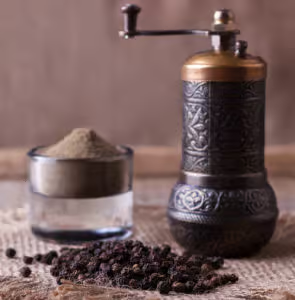
Piperine makes nootropics and pharmaceuticals more bioavailable by inhibiting the drug transporter P-glycoprotein, and the major drug-metabolizing enzyme CYP3A4 active primarily in your liver.[ii]
Piperine does more than just boost the action of your nootropic stack. It acts as a nootropic as well. In this article we investigate how Piperine can help optimize your brain.
Piperine helps:
- Nootropic Effectiveness. Piperine inhibits the drug transporter P-glycoprotein, and the drug-metabolizing enzyme CYP3A4 in your liver. Allowing more of each nootropic in your stack to be absorbed and used as intended.
- Neurotransmitters. Piperine is a powerful monoamine oxidase (MAO) inhibitor (MAOI). Boosting serotonin, dopamine and norepinephrine levels in the brain. Decreasing anxiety, improving mood and memory.
- Neuroprotection. Piperine has potent antioxidant, anti-inflammatory, and anti-tumor capabilities. Helping to reduce toxic free radicals and protecting your brain from oxidative damage.
Overview
Piperine is an alkaloid extracted from Piper Nigrum (Black Pepper). And used to boost the effectiveness of other nootropics and drugs.
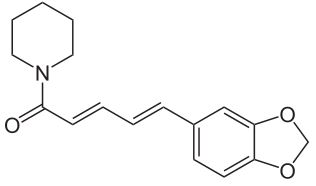
Black Pepper (Piper Nigrum) is a flowering vine native to south India. Its dried fruit is used world-wide as a spice and seasoning.
Research has found Piperine can protect against oxidative damage by inhibiting free radicals and reactive oxygen species. Piperine protects against oxidative stress. And has been found to have anti-mutagenic and anti-tumor capabilities.[iii]
But Piperine’s biggest claim to fame is its ability to boost the effectiveness of your nootropic stack.
Piperine’s effects are similar to grapefruit juice and St. John’s wort. It inhibits the drug transporter P-glycoprotein, and the major drug-metabolizing enzyme CYP3A4. Amplifying the effect of nootropics by preventing elimination in your liver and urine. And allowing increased absorption for use by your body and brain.
How does Piperine work in the Brain?
Piperine boosts brain health and function in several ways. But two in particular stand out.
- Piperine is an anti-depressant. Piperine is a monoamine oxidase (MAO) inhibitor (MAOI). Piperine inhibits both MAO-A and MAO-B. Research has found that Piperine is as effective as the popular pharmaceutical antidepressant Prozac® (fluoxetine).[iv]
Piperine has a profound effect on serotonin in the brain. Piperine has been shown in the lab to provide a substantial increase in serotonin (5-HT) in both the hippocampus and frontal cortex.[v]
And this is where it gets very interesting. Scientists found that combining Piperine with Resveratrol provided significant antidepressant action. But this stack also offered relief from oxidative stress, inflammation and provided neuroprotection.[vi]
Resveratrol on its own is a good antidepressant. And Piperine also provides antidepressant action as a MAO Inhibitor and serotonin booster. When combined, Piperine also boosts the bioavailability of Resveratrol. This combination is a potent natural antidepressant. Without the side effects that come with prescription MAOI’s and SSRI’s.
- Piperine boosts bioavailability. Piperine inhibits the drug transporter P-glycoprotein, and the major drug-metabolizing enzyme CYP3A4. This can have profound implications on how well and how much of each nootropic in your stack actually gets to your brain.
Your liver protects you by attaching a glucuronide molecule to nootropics (and drugs) which sends a signal for them to be excreted in your urine. This process prevents excessive levels of nootropic supplements (and drugs) in your body. But it can also work against your brain optimization goals.
A great example is curcumin, the bioactive compound found in turmeric. You will not experience the medicinal properties of curcumin when taken on its own. Curcumin has very poor bioavailability when taken as a supplement because of its rapid metabolism in your liver and intestinal wall.
Researchers in India gave mice 2 grams/kilogram of curcumin and tested blood levels over 4 hours. Very small amounts of curcumin were detected in blood in the first 2 hours.
The scientists then administered the same amount of curcumin combined with 20 mg/k of Piperine. Blood levels of curcumin were detected sooner with Piperine added. And stayed in the blood longer. Bioavailability of curcumin in mice increased by 154% when combined with Piperine.
The researchers then tried the experiment with humans. A 2-gram dose of curcumin on its own was not detectable in blood samples. But curcumin combined with Piperine in humans made a profound difference.
2-grams of curcumin combined with 20 mg of Piperine in humans showed up in blood samples within 15 minutes. And Piperine increased the bioavailability of curcumin by 2000%.[vii]
How things go bad
The job of our liver is to clear our body of unwanted compounds and toxins. And excrete them as waste through our urine. But some of the nootropics and especially prescription drugs are seen as “foreign matter” by our liver. And are eliminated as ‘waste’ even if our intention was to benefit our body and brain.
To make matters even worse, include getting older. Our brain chemistry and energy metabolism changes.
↓ Serotonin, dopamine and norepinephrine levels decline
↓ Recall, reaction time and mood diminish
↓ Toxins, oxidation and free radicals damage neurons
↓ Brain cell membranes degenerate
↓ Bioavailability of nootropics and supplements decline
All of these changes can happen at any age. And some are contributing factors to the neurodegenerative diseases of aging, including Alzheimer’s and dementia.
This is where Piperine can help.
Piperine to the rescue
Research from hundreds of studies have shown that Piperine will:
- Boost the bioavailability of nootropics
- Increase the effectiveness of nootropics
- Work as an antidepressant
- Relieve oxidative stress
- Prevent inflammation
- Provide neuroprotection
- Protect against tumors and cancers
How does Piperine feel?
Piperine on its own has antidepressant capabilities. So you may feel your mood improve.
If you are using curcumin or turmeric for its anti-inflammatory benefit, you’ll likely find that these supplements will be much more effective in relieving pain by adding Piperine.
You should notice a substantial benefit in the effectiveness of most nootropics and prescriptions meds when stacked with Piperine.
Some neurohackers report a reduction in anxiety (that can be caused by some supplements) by taking it with Piperine.
If you are dealing with arthritis you may find pain levels will decrease by using Piperine. This nootropic is a potent anti-inflammatory even on its own.
You may be able to reduce the amount of some nootropics and medications by stacking them with Piperine. Because the effectiveness of most of these supplements and meds will get a boost by combining them with Piperine.
The Research
Piperine Potentiates the Effects of Curcumin
Stress in everyday life puts every one of us in danger of developing some type of cognitive disorder. And curcumin is a proven therapy to help protect us from this assault on our cognition and brain health.
To help illustrate what happens in our brain when under stress, scientists subjected male Laca mice to stress-induced cognitive impairment for 28 days.
Chronic stress impaired memory, locomotor activity, elevated toxins like nitrate, decreased the master antioxidant glutathione, damaged mitochondria enzyme function, reduced acetylcholine levels, and increased stress cortisol levels.
Researchers then treated the mice with either 200 or 400 mg/k per day of curcumin. All of the damage caused by stress was reversed to a certain extent.
Then the team added 20 mg/k of Piperine to a reduced daily curcumin (100 or 200 mg/k) supplement. The results clearly demonstrated that Piperine enhanced the bioavailability of the curcumin. And greatly potentiated the effects against stress-induced cognitive impairment.[viii]
Piperine as an Antidepressant
Researchers injected mice with 60 mg/k of Piperine. An hour after the injection, the team measured serotonin, dopamine and norepinephrine levels. Serotonin levels were significantly higher in the cerebral cortex of the mice. Dopamine levels were markedly higher in the hippocampus, midbrain and cerebellum. And norepinephrine levels were lower in every part of the brain.[ix]
Scientists in Korea analyzed Piperine (ethanol extract) for its monoamine oxidase (MAO) inhibitor capabilities. Piperine showed an inhibitory effect against MAO-A and MAO-B.
The team found that Piperine exhibited the same type of antidepressant effect in the brain as the popular prescription drug Prozac® (fluoxetine).
The researchers concluded that Piperine possesses potent anti-depressant properties. And Piperine is a promising pharmacotherapeutic candidate as an antidepressant agent.[x]
Piperine Protects Against Alzheimer’s
A study conducted in Thailand looked at Piperine’s effect on memory and neurodegeneration in an animal model of Alzheimer’s Disease.
Adult male Wistar rats were given Piperine at doses ranging from 5, 10 and 20 mg/k of body weight for 2 weeks before and 1 week after artificially induced Alzheimer’s-like conditions in the rat’s brain.
The results showed that Piperine at all dosage ranges significantly improved memory impairment and neurodegeneration in the hippocampus.
The scientists speculated the mechanism of action for Piperine to produce these effects could be a decrease in lipid peroxidation and the acetylcholinesterase enzyme. (This enzyme degrades acetylcholine synthesis in the brain). Piperine also demonstrated a neurotrophic effect in the hippocampus.[xi]
Dosage Notes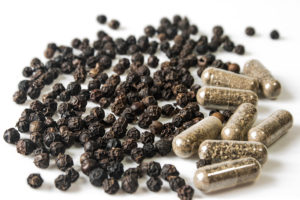
The recommended dosage of Piperine to enhance bioavailability of nootropic supplements is 5 – 20 mg per day.
Many nootropic stacks and some supplement formulas (i.e. curcumin, turmeric and resveratrol) come pre-stacked with the appropriate dose of Piperine.
For example, Performance Lab® Energy uses the patented BioPerine® form of Piperine in their premium energy stack.
I love this energy stack and use it twice a day instead of the morning and noon doses of ALCAR I used in the past.
This pre-formulated nootropic stack also includes the patented forms of MicroActive® Q10, BioPQQ®, and Bio-enhanced® Na-RALA (alpha lipoic acid).
You can see my full review here of how I use the Performance Lab Energy stack in treating Adult ADD.
Side Effects
Piperine is an extract of Black Pepper and considered non-toxic and safe to use at recommended doses.
Piperine potentiates the effect of nearly all nootropic supplements and prescription medications. So be very aware that boosting the effects of certain supplements or drugs could produce unwanted consequences.
Be cautious of using Piperine in addition to Piperine that may already be in one or more of your supplements. Too much Piperine will not only amplify most of the supplements and drugs you’re taking. But could also negate the effects of some.
Available Forms
BioPerine® is a patented form of Piperine made by Sabinsa Corporation. And licensed to other supplement manufacturers to include in their formulas, or as a standalone product. It’s the only source I’m aware of who have clinical studies to back up their claims of safety and efficacy.
You can also get Piperine by grinding black peppercorns on your food. The problem is there is no way to measure how much Piperine you’re actually using.
Nootropics Expert Recommendation
Piperine up to 20 mg per day
 We recommend using Piperine as a nootropic supplement.
We recommend using Piperine as a nootropic supplement.
Your body does not make Piperine on its own. So you must take it as a supplement.
Piperine is especially helpful for boosting the bioavailability of other nootropics in your stack.
Beware that Piperine also amplifies the potency of other supplements and meds you are taking. Boosting the effect of certain SSRI’s and some other meds could be extremely dangerous.
Piperine is also an effective antidepressant, and can help lower stress and anxiety. Piperine is a potent anti-inflammatory and could help reduce pain if you are dealing with arthritis. Or other conditions caused by excess inflammation in your body.
Piperine is a powerful neuroprotectant and makes a great addition to any nootropic stack.
You can buy Piperine or BioPerine® as an individual supplement. And some premium pre-formulated nootropic stacks like Performance Lab® Energy include BioPerine.

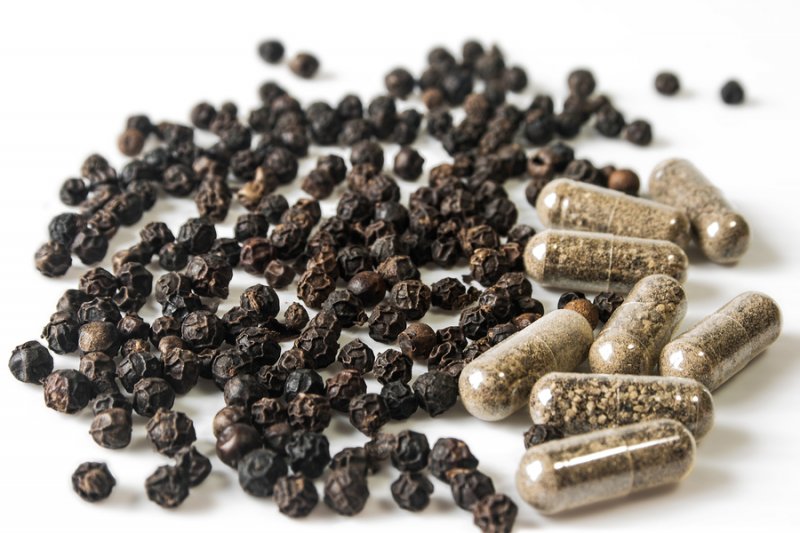
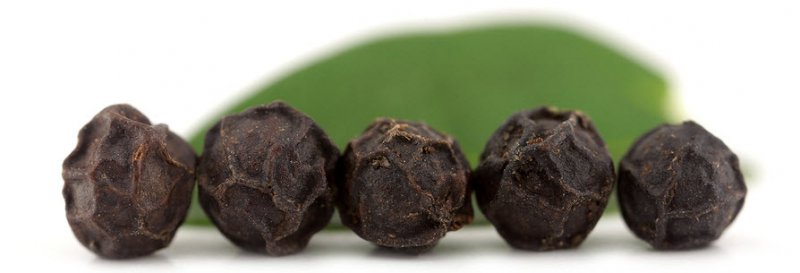

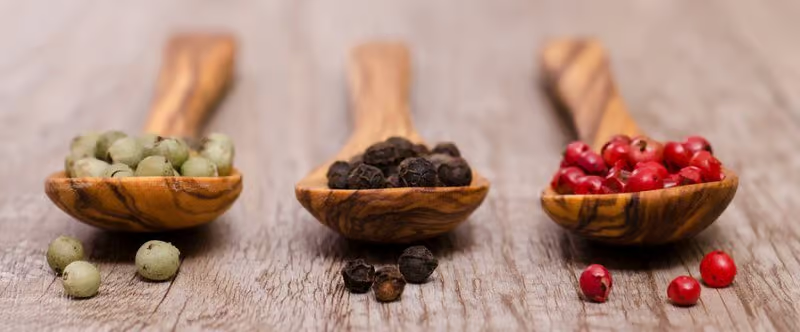





Join The Discussion - 79 comments
Aaron
July 20, 2020
FYI- I found minor typos in this great article-
“I love this energy stack and use in twice a day instead of the morning and noon doses of ALCAR is used in the past.”
David Tomen
July 21, 2020
Thank you Aaron. No matter how many times I proofread what I wrote …
Aaron
July 25, 2020
I do the very same thing. 🙂
Wim
February 1, 2020
Hi David,
“Researchers injected mice with 60 mg/k of Piperine. An hour after the injection, the team measured….And norepinephrine levels were lower in every part of the brain”
“Piperine is a powerful monoamine oxidase (MAO) inhibitor (MAOI). Boosting … norepinephrine levels in the brain.”
That research seems to contradict the MAOI effect of Piperine on norepinephrine.
thanks
Do you have an idea why?
David Tomen
February 2, 2020
Wim, I can only imagine that directly injecting most things directly into a rat’s brain is going to produce some unusual results.
Study after study show that Piperine is an MAOI which raises dopamine, norepinephrine and serotonin. Which is a bonus because as neurohackers, we primarily use Piperine to increase the bioavailability of nootropics. Not with the intention of boosting the catecholamines.
Henry
April 30, 2020
Hello David and Wim.
David, I believe he is speaking of the last sentence of the first paragraph under “Piperine As An Antidepressant.” It says “lower” instead of “higher.” It should say “higher” i believe.
David Tomen
May 1, 2020
Henry, Piperine is a potent MAOI but the research has only been done in animals and intravenously at high doses. Piperine is not normally used as anything other than to help boost the bioavailability of other nootropics. And is used at low doses.
Henry
May 1, 2020
Oh I gotcha.Haha… I reread the article from the source. Thanks again for all your work, David.
nick butera
January 27, 2020
how long can Piperine from freshly ground black pepper mixed with turmeric power be kept before it loses its effect
David Tomen
January 27, 2020
Nick, that is an impossible question to answer because you’d first need to know how much Piperine was in your ground black pepper. And I imagine there is not enough to provide much of a benefit. This is why we use Piperine which is a highly concentrated extract.
Do not count on getting much benefit from Turmeric if all you’re using is ground pepper to boost its bioavailability.
Nicholas Castillo
January 17, 2020
Hello,
I am wondering if there is any definitive answer to whether combining a Piperine and Curcumin supplement with an SSRI. The worry being seretonin syndrome. I have personally combined these with no noticeable consequence but I can’t help wondering if it’s not a good idea. I talked to a pharmacist and they said there should be no interaction. Also there seems to be a few studies done in which there was a positive outcome with the combination.
Thanks,
Nick
David Tomen
January 17, 2020
Nicholas, I’m not aware of any concern regarding combining Curcumin with an SSRI or other type of antidepressant. I think this is at least partially because of Curcumin’s problem with bioavailability.
Curcumin is very effective even with this challenge because Piperine helps. A lot. But not so much and so directly that as it’s raising serotonin and dopamine levels that it’ll cause a problem for most people when using an SSRI or SNRI.
In fact, one study I include in the research notes used curcumin and Prozac more successfully than either used on their own: https://www.ncbi.nlm.nih.gov/pubmed/23832433
So I don’t think there is a “definitive answer” to your concern. But it seems to weigh in the direction of being safe for most people. Until proven otherwise.
Robert Long
September 28, 2019
I can’t understand where all these odd nootropics have an attribute of “improving mood”?
It seems many of them say this but are we taking about in healthy well sound minded people who taste a good dish of food like Pepper Corn Steak and get happy?
I did Tumeric with Piperine for a year and had no affect on mood.
David Tomen
September 29, 2019
Robert, check under the section above “Piperine as an Antidepressant” and you’ll see the Korean researchers found Piperine showed monoamine oxidase (MAO) inhibitor capabilities. Piperine showed an inhibitory effect against MAO-A and MAO-B. Which increases dopamine and serotonin and providing its mood lifting benefit. But at much higher dosages than what we normally use Piperine for.
We use Piperine to boost the bioavailability of Turmeric. It does this by inhibiting the drug transporter P-glycoprotein, and the major drug-metabolizing enzyme CYP3A4. But to get this benefit we only need 10 – 20 mg of Piperine. And not the higher dosages used in the above clinical trial.
Caio
May 29, 2019
Hello David!
Thank you very much for the great work you are doing for us!
I was wondering, could I have the same effectiveness of taking N-Acetyl-L-Tyosine, if i take just L-tyrosine but stacking it with piperine, in the attempt to increase it’s bioavailability?
David Tomen
May 30, 2019
Caio, not sure if using Piperine with L-Tyrosine would help. L-Tyrosine is an amino acid and depends more on amino acid transporter availability than anything else.
Fouzi
March 31, 2019
Dear David thank you for what u r doing
I would like to ask is it safe to take bioperine since am taking a half tablet (Cipralex 10mg) daily and one tablet lerica 25mg 3 times a week ?
I would appreciate your answer thank you
David Tomen
March 31, 2019
Fouzi, it’s certainly not contraindicated but using Bioperine while using these drugs will boost the effectiveness of each drug. Sometimes that can be dangerous.
Tammy
June 2, 2017
David if you have built up a tolerance to your ADD meds would Piperine help a little with the tolerance? Also would cayenne pepper act in the same fashion? Also, I viewed some of your Nootropics video over on youtube , I thought they were great!
David Tomen
June 2, 2017
Tammy, Piperine could help with ADD symptoms because it’s a MAOI inhibitor of both A and B. But I don’t think it would help tolerance much (if any). Tolerance is likely caused by damage to dopamine receptors. Which need to be replaced and/or repaired. (I do not believe cayenne has the same effect in the brain).
And as we age our brain produces less dopamine. The enzyme MAO increases which puts a damper on dopamine. That’s the only place Piperine would have some effect. A couple of the supplements I use have Piperine as part of the formula which helps everything I take in my stack. But I’ve found (for this brain anyway) I’ve got to be much more aggressive in increasing dopamine and replacing receptors.
Thanks very much for the compliment on the new YouTube channel. It’s a work in progress. 🙂